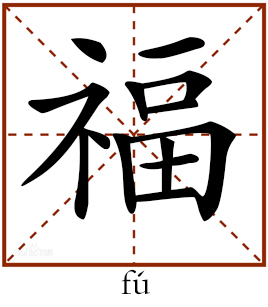blessing

This Chinese character refers to blessings that bring good luck and fortune to someone.
福祸相依
fú huò xiāng yī
This idiom means that blessings and misfortunes are interdependent and are usually interchangeable or interconvertible. This philosophical wisdom is seen in the 58th chapter of the classic Laozi. As Laozi believes, misfortune is the premise that forms the basis of fortune; fortune comprises factors of misfortune.
This phrase is best demonstrated by the story of “The Farmer’s Luck.” There was once an old farmer who had grown crops for many years on Northern China’s frontier. One day, his horse ran away into nomadic territory. Upon hearing the news, his neighbors came to visit and said to him sympathetically, “Such bad luck!” In calm, the farmer replied: “Isn’t it good luck?”
Several months later, the lost horse returned, bringing with it some horses of the nomadic tribes. “Such good luck!” his neighbors rejoiced. With self-composure, the farmer replied, “Isn’t it bad luck?”
Among the farmer’s livestock, many good horses were raised. His son had a martial nature and liked riding. One day, his son tried to ride an untamed horse and was thrown off accidentally. With a leg broken, his son was crippled for life. Again, the neighbors came to offer their sympathy. “Such bad luck!” they sighed. In peace, the farmer answered, “Maybe it’s good luck.”
One year later, the barbarian tribes invaded the border. Many of the young men were drafted by the military officials to fight in the war. The casualties were innumerable, and many villagers lost their lives in the battlefield. But the son of the old man, crippled by his limp, was passed by and did not go to war. His son thus retained his life and spent the rest of his days in comfort. “Such good luck!” exclaimed the neighbors.
This story expounds on the complementary relationship between the opposites of misfortune and blessing. It reveals the truth that the two are interactive and closely correlated. It teaches people a lesson to view things with a detached perspective and a peaceful mind. When good fortune arises, do not be complacent, because it might be a prelude to disaster; when a setback comes, do not be downhearted, because with courage and effort, good luck will return.
edited by BAI LE

 PRINT
PRINT CLOSE
CLOSE